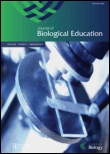
JOURNAL OF BIOLOGICAL EDUCATION
Scope & Guideline
Inspiring the Future of Biological Education
Introduction
Aims and Scopes
- Innovative Teaching Methods:
The journal emphasizes the development and evaluation of innovative educational strategies, including inquiry-based learning, problem-based learning, and the use of gamification to enhance student engagement and understanding in biology. - Interdisciplinary Approaches:
It promotes interdisciplinary practices that connect biology education with other fields, fostering a holistic understanding of biological concepts and their applications in real-world scenarios. - Technology Integration:
The journal highlights the use of technology in teaching biology, such as virtual reality, mobile applications, and online learning platforms, to create immersive and interactive learning experiences. - Curriculum Development and Reform:
It focuses on curriculum analysis and reform to align biology education with contemporary scientific knowledge and educational standards, addressing issues such as environmental literacy and sustainability. - Research-Based Teaching:
The journal advocates for research-led teaching practices that enhance the educational experience by incorporating current scientific research into the curriculum. - Assessment and Evaluation:
It explores innovative assessment methods to evaluate student understanding, skills, and attitudes towards biology, ensuring that educational practices effectively measure learning outcomes.
Trending and Emerging
- Environmental Education and Sustainability:
Recent publications increasingly emphasize environmental education and sustainability, highlighting the importance of ecological literacy and the role of biology education in fostering pro-environmental behaviors among students. - Use of Technology and Digital Tools:
There is a growing trend towards the integration of digital tools and technology in biology education, such as virtual labs, online simulations, and educational apps, which enhance interactive learning experiences. - Inclusive and Diverse Education:
Emerging themes focus on inclusive education practices that address diverse learning needs, ensuring equitable access to biology education for all students, including those with disabilities. - Socio-Scientific Issues (SSI):
The exploration of socio-scientific issues in biology education is gaining traction, as it helps students engage with real-world problems and develop critical thinking and argumentation skills. - Collaborative and Cooperative Learning:
There is an increasing focus on collaborative learning strategies, where students work together to solve problems and engage in scientific inquiry, fostering a sense of community and shared knowledge.
Declining or Waning
- Traditional Lecture-Based Teaching:
There is a noticeable decline in publications focused on traditional lecture-based teaching methods, as the journal increasingly favors active learning strategies that promote student engagement and participation. - Basic Knowledge Retention Strategies:
Research centered around rote memorization and basic knowledge retention strategies is waning, with a shift towards enhancing critical thinking and problem-solving skills in biology education. - General Biology Curriculum:
Topics related to the general biology curriculum without a specific focus on innovative pedagogical approaches are becoming less common, reflecting a move towards more specialized and context-based educational strategies. - Standardized Testing Practices:
There is a reduced emphasis on standardized testing practices, as the journal promotes alternative assessment methods that are more aligned with holistic and formative evaluation techniques. - Content-Centric Approaches:
The focus on content-centric teaching, where the emphasis is solely on the delivery of biological facts, is declining, as the journal encourages integrating concepts of scientific inquiry and real-world applications.
Similar Journals
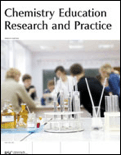
Chemistry Education Research and Practice
Empowering Educators with Cutting-Edge Chemistry InsightsChemistry Education Research and Practice is a prominent journal dedicated to advancing the field of chemistry education through rigorous research and innovative practices. Published by the Royal Society of Chemistry, this journal, with an ISSN of 1109-4028 and an E-ISSN of 1756-1108, operates out of Greece and has established itself as a leading voice in the intersection of chemistry and educational methodology. With a remarkable impact factor and ranking in the top quartiles (Q1) for both Chemistry and Education in 2023, it appeals to a diverse audience of researchers, educators, and practitioners who are passionate about enhancing chemistry instruction and learning experiences. The journal spans a wide range of topics, aiming to promote and disseminate high-quality research that informs pedagogical strategies, curriculum development, and educational policy. By providing a platform for vibrant discussions and new ideas, Chemistry Education Research and Practice plays a crucial role in shaping the future of chemistry education worldwide and continues to impact the academic community significantly.
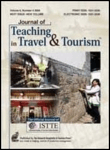
Journal of Teaching in Travel & Tourism
Bridging Theory and Practice in Travel EducationJournal of Teaching in Travel & Tourism, published by Routledge Journals, Taylor & Francis Ltd, is a leading academic resource dedicated to the field of educational practices in the travel and tourism industry. Since its inception in 2001, this journal has aimed to bridge the gap between theoretical foundations and applied educational techniques, providing a platform for researchers, educators, and industry professionals to share innovative pedagogical approaches and case studies. With an impressive ranking in the 2023 quartiles, including Q2 in Education and Q3 in Tourism, Leisure and Hospitality Management, it reflects significant influence and relevance in its fields. Although it does not currently offer Open Access, the journal is committed to advancing knowledge through rigorous research articles, critical reviews, and instructional strategies that explore the evolving landscape of travel and tourism education. The journal's robust visibility on platforms like Scopus, ranking in the top 25% among Social Sciences and Education, underscores its importance as an indispensable resource for anyone invested in the academic study or practical application of travel and tourism pedagogy.
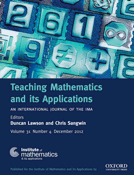
Teaching Mathematics and Its Applications
Bridging Theory and Practice in Mathematics TeachingTeaching Mathematics and Its Applications is a prestigious interdisciplinary journal published by Oxford University Press, focusing on innovative pedagogical approaches and research in the fields of mathematics and education. With an impressive impact factor and ranking in the top quartile (Q1) for both education and miscellaneous mathematics categories, the journal is an essential resource for researchers, educators, and practitioners aiming to enhance mathematics teaching and learning. Since its inception in 1982, the journal has provided a platform for the dissemination of cutting-edge research, reviews, and case studies that foster the advancement of mathematical literacy and application across diverse educational settings. While the journal is not open access, its wide reach and the significant Scopus rankings—86th in General Mathematics and 688th in Education—reaffirm its status as a leading authority in the discipline. By emphasizing both theoretical perspectives and practical applications, Teaching Mathematics and Its Applications plays a vital role in shaping the future of mathematics education worldwide.

International Journal of Mathematical Education in Science and Technology
Exploring New Frontiers in Math Education ExcellenceThe International Journal of Mathematical Education in Science and Technology, published by TAYLOR & FRANCIS LTD, is a leading academic journal dedicated to the interdisciplinary field of mathematical education, emphasizing the integration of science and technology. With an ISSN of 0020-739X and E-ISSN 1464-5211, the journal serves as a vital resource for researchers, educators, and practitioners seeking innovative methodologies and pedagogical frameworks in mathematics education. As of 2023, it has achieved a prestigious standing in Q2 quartiles across three categories: Applied Mathematics, Education, and Mathematics (miscellaneous), with notable rankings in Scopus, including 16th in Mathematics and 486th in Social Sciences Education. The journal, which has been converging its research and findings since 1970 and will continue to do so until 2024, is not available as an open access publication, but offers a wealth of insights for those committed to enhancing mathematical understanding in various educational contexts. Its emphasis on cutting-edge research makes it a crucial conduit for advancements in both theoretical and practical aspects of mathematics education.

Journal of Teaching English for Specific and Academic Purposes
Empowering Educators, Elevating English.Journal of Teaching English for Specific and Academic Purposes, published by UNIV NIS, FAC SCI MATH, is a pivotal platform for researchers, educators, and practitioners in the field of language education, particularly focusing on specialized and academic English instruction. With an ISSN of 2334-9182 and an E-ISSN of 2334-9212, this journal serves as a conduit for innovative research and pedagogical advancements from 2019 to 2024, contributing significantly to the understanding of language teaching methodologies. As a recognized entity in the Q3 category of Education as per 2023 evaluations, it ranks #1071 in Scopus’s social sciences education realm, indicating its growing influence and relevance. Although it operates without open access, the journal aims to provide a comprehensive exploration of effective teaching strategies and academic practices, crucial for both current scholars and institutions. The journal welcomes diverse contributions that shed light on the evolving landscape of English language teaching, making it an essential resource for those striving to enhance their knowledge and practice in this important area.

Revista Eureka sobre Ensenanza y Divulgacion de las Ciencias
Transforming Pedagogy with Cutting-Edge ResearchRevista Eureka sobre Ensenanza y Divulgacion de las Ciencias is a premier open-access journal dedicated to advancing the fields of education and science communication. Published by the University of Cadiz in Spain, this journal has established itself as a vital platform since its inception in 2004. With an ISSN of 1697-011X, it aims to disseminate innovative research and pedagogical strategies that enhance the understanding and teaching of scientific disciplines. As of 2023, it holds a Q3 categorization in Education with a Scopus rank of #989/1543, reflecting its commitment to academic excellence and relevance. The journal's open-access model ensures that valuable research is readily available to educators and researchers worldwide, fostering a community engaged in the promotion of effective science education. With a focus on bridging theoretical and practical applications, Revista Eureka invites contributions that spark dialogue and inspire new methodologies in science teaching and dissemination.

Pegem Egitim ve Ogretim Dergisi
Nurturing Knowledge for the Evolving ClassroomPegem Egitim ve Ogretim Dergisi is a prominent academic journal published by PEGEM AKAD YAYINCILIK EGITIM DANISMANLIK HIZMETLERI TIC LTD STI, specializing in the field of education. Based in Turkey, this journal offers a platform for scholarly discourse, catering to both emerging and established researchers in the educational domain. With its ISSN 2148-239X, the journal aims to provide insights into contemporary educational practices, pedagogical innovations, and research findings that influence teaching and learning. Although classified in the Q4 quartile of the education category as of 2022 and achieving a Scopus rank of 1178 out of 1469, it remains a valuable resource for practitioners and academics alike. The journal ceased Scopus coverage in 2023, yet it continues to be a relevant outlet for educational research in Turkey and beyond. While it operates under traditional access models, the potential for collaborative research and knowledge sharing makes it a noteworthy choice for those engaged in the evolving landscape of education.
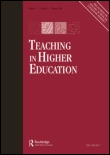
TEACHING IN HIGHER EDUCATION
Exploring transformative practices in university teaching.TEACHING IN HIGHER EDUCATION is a premier academic journal published by Routledge Journals, Taylor & Francis Ltd, dedicated to advancing the scholarship and practice of teaching within the higher education sector. With an ISSN of 1356-2517 and an E-ISSN of 1470-1294, this journal is widely recognized for its profound impact in the field, boasting a 2023 category rank of Q1 in Education, placing it in the top tier of educational research. Its commitment to fostering an inclusive and dynamic discourse on pedagogical methods and learning frameworks makes it essential reading for researchers, educators, and policymakers alike. Spanning topics such as student engagement, curriculum development, and innovative teaching strategies, TEACHING IN HIGHER EDUCATION aims to contribute to ongoing conversations and practical applications that enhance the educational landscape. While an Open Access option is not available, the journal maintains a robust readership, with its articles being rigorously peer-reviewed and disseminated to reflect cutting-edge research trends and practices in education.

Pamukkale Universitesi Egitim Fakultesi Dergisi-Pamukkale University Journal of Education
Bridging theory and practice in education.Pamukkale University Journal of Education is a distinguished open access academic journal dedicated to advancing research and discourse in the field of education. Published by DERGIPARK AKAD since 2000, this journal offers a platform for scholars and practitioners to share their findings and innovative practices in education. The journal operates under the ISSN 1301-0085 and E-ISSN 1309-0275, ensuring a broad dissemination of knowledge. Located in Ankara, Turkey, it serves as a vital resource for educational researchers, educators, and policy-makers interested in the latest trends and developments within the educational landscape. If you aim to contribute to the evolution of education through rigorous research or seek to access cutting-edge studies, the Pamukkale University Journal of Education is an essential addition to your academic repertoire.

Informatics in Education
Exploring the Future of Education through InformaticsInformatics in Education is a premier academic journal published by Vilnius University, Institute of Mathematics and Informatics, focusing on the intersection of information technology and pedagogical innovation. With an ISSN of 1648-5831 and an E-ISSN of 2335-8971, this Open Access journal has been disseminating critical research since 2003, enabling widespread accessibility and collaboration across the global educational community. The journal's commitment to advancing the field is demonstrated by its impressive 2023 Category Quartiles: Q1 in Communication and Education and Q2 in Computer Science Applications, highlighting its significant impact on these disciplines. Located in Lithuania, Informatics in Education ranks impressively in Scopus, with a Social Sciences Communication rank of #54/511 (89th percentile) and a Social Sciences Education rank of #188/1543 (87th percentile). The journal's goals include fostering research that informs pedagogical practices and enhances educational outcomes through the innovative use of technology, ensuring it remains at the forefront of research in this vital field. Researchers, professionals, and students alike will find a wealth of knowledge within its pages to support their work and learning endeavors.